Chapter 3 | 8th Maths - Algebra | 8th Maths : Chapter 3 : Algebra
Chapter: 8th Maths : Chapter 3 : Algebra
Algebra
UNIT 3
ALGEBRA

Learning Objectives
• To recall
addition and subtraction of expressions.
• To know
how to multiply algebraic expressions with integer co-efficients
• To know
how to divide algebraic expressions by monomials.
• To recall
the identities (a +
b)2 ,(a − b)2 ,(a 2 −
b2 ) and (x + a)(x + b)
and able to apply them in problems.
• To understand
the identities (a +
b)3 ,(a − b)3 ,(x + a)(x + b)(x + c)
and apply them in problems.
• To recognize
expressions that are factorizable of the type (a
+
b)3 and (a − b)3
.
• To solve
word problems that involve linear equations.
• To know
how to plot the points in the graph.
• To draw
graphs of simple linear equations.
Recap
In our earlier
classes, we have learnt about constants, variables, like terms, unlike terms, co-efficients,
numerical and algebraic expressions. Later, we have done some basic operations like
addition and subtraction on algebraic expressions. Now, we shall recollect them
and extend the learning.
Further,
we are going to learn about multiplication and division of algebraic expressions
and algebraic identities.
Answer the following questions :
1. Write the number of terms in the following
expressions
(i) x + y + z −
xyz
(ii) m2n2c
(iii) a2b2c
− ab2c2 + a2bc2 + 3abc
(iv) 8x2 − 4xy + 7xy2
2. Identify the numerical co-efficient
of each term in the following expressions.
(i) 2x2 − 5xy + 6 y2 + 7x −10 y + 9
(ii) x/3 + 2y/5 −
xy + 7
(i) 2x2
− 5xy + 6y2 + 7x − 10y + 9
Answer:
Numerical co efficient in 2x2
is 2
Numerical co efficient in −5xy
is −5
Numerical co efficient in 6y2
is 6
Numerical co efficient in 7x is
7
Numerical co efficient in −10y
is − 10
Numerical co−efficient in 9 is 9
(ii) x/3 + 2y/5 − xy + 7
Answer:
Numerical co efficient in x/3
is 1/3
Numerical co efficient in 2y/5
is 2/5
Numerical co efficient in −xy
is −1
Numerical co efficient in 7 is 7
3. Pick out the like terms from the following:
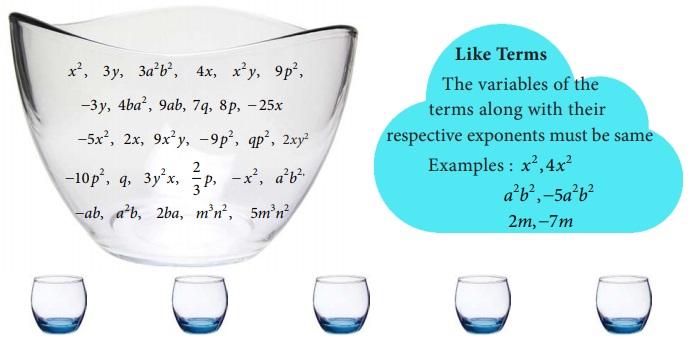
Solution:
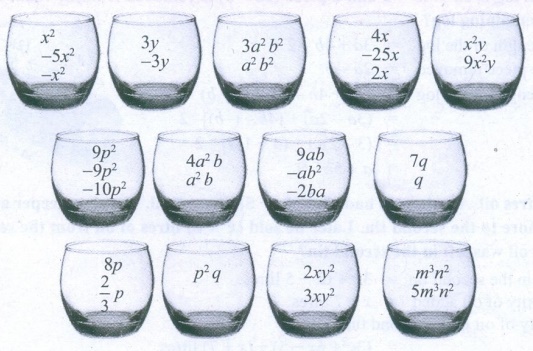
4. Add : 2x , 6 y, 9x − 2y
Solution:
2x + 6y + 9x − 2y = 2x + 9x
+ 6y − 2y = (2 + 9)x + (6 − 2)y = 11x + 4y
5. Simplify : (5x 3 y3
− 3x 2 y2 + xy
+ 7)
+ (2xy + x
3 y3 − 5 + 2x 2 y2 )
Solution:
(5x3y3 − 3x2y2
+ xy + 7) + (2xy + x3y3 − 5 +
2x2y2)
= 5x3y3 + x3y3
– 3x2y2 + 2x2y2
+ xy + 2xy + 7 − 5
= (5 + 1) x3y3 + (−3 + 2) x2y2
+ (1 + 2) xy + 2
= 6 x3y3 − x2y2
+ 3xy + 2
6. The sides of a triangle are 2x − 5y + 9, 3y + 6x − 7 and −4 x + y
+ 10
. Find the perimeter of the triangle .
Solution:
Perimeter of the triangle = Sum of three sides
= (2x − 5y + 9) + (3y + 6x −7) + (−4x
+ y + 10)
= 2x − 5y + 9 + 3y + 6x − 7 − 4x
+ y + 10
= 2x + 6x − 4x − 5y + 3y + y
+ 9 − 7 + 10
= (2 + 6 − 4)x + (−5 +
3 + l) y + (9 − 7 + 10)
= 4x –y + 12
∴ Perimeter of the
triangle = 4x –y + 12 units.
7. Subtract −2mn from 6mn.
Solution:
6 mn − (−2 mn) = 6 mn + (+2 mn)
= (6 + 2) mn = 8 mn
8. Subtract 6a 2 − 5ab + 3b2 from 4a 2 − 3ab + b2 .
Solution:
(4a2 − 3ab + b2) − (6a2
− 5ab + 3b2)
= (4a2 − 6a2) + (− 3ab
− (−5 ab)] + (b2 − 3b2)
= (4 − 6) a2 + [−3ab + (+5 ab)]
+ (1 − 3) b2
= [4 + (− 6)] a2 + (−3 + 5) ab + [1+ (−3)]
b2
= −2a2 + 2ab − 2b2
9. The length of a log is 3a + 4b − 2 and a piece (2a − b)
is removed from it. What is the length of the remaining log?
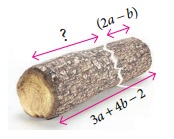
Solution:
Length of the log = 3a + 4b − 2
Length of the piece removed = 2a − b
Remaining length of the log = (3a + 4b −2) − (2a
− b)
= (3a – 2a) + [4b − (− b)] − 2
= (3 − 2)a + (4 + 1)b − 2
= a + 5b – 2
10. A tin had x litres of oil. Another tin had (3x2 + 6x − 5) litres of oil.
The shopkeeper added (x+7) litres
more to the second tin. Later, he sold (x2+6)
litres of oil from the second tin. How
much oil was left in the second tin?
Solution:
Quantity of oil in the second tin = 3x2 + 6x
− 5 litres.
Quantity of oil added = x + 7 litres
∴ Total quantity of oil in
the second tin
= (3x2 + 6x − 5) + (x + 7)
litres
= 3x2 + (6x + x) + (−5 + 7) = 3x2
+ (6 + 1 )x + 2
= 3x2 + 7x + 2 litres
Quantity of oil sold = x2 + 6 litres
∴ Quantity of oil left in the second tin
= (3x2 + 7x + 2) − (x2
+ 6) = (3x2 − x2) + 7x + (2 − 6)
= (3 − 1) x2 + 7x + (−4) = 2x2
+ 7x − 4
Quantity of oil left = 2x2 + 7x − 4
litres
MATHEMATICS ALIVE – ALGEBRA
IN REAL LIFE
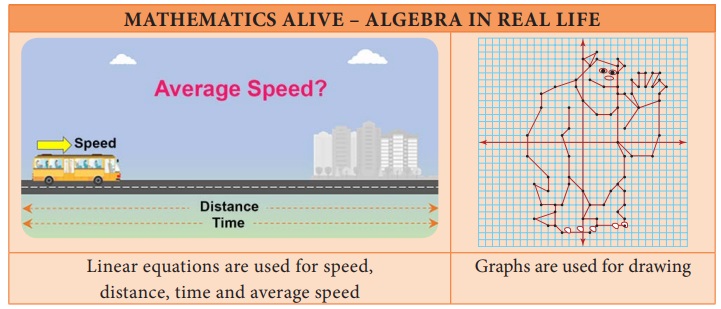
Introduction
Let us consider
the given situation that Ganesh planted saplings in his garden. He planted 10 rows
each with 5 saplings. Can you say how many saplings were planted?
Yes, we know
that, the total number of saplings is the product of number of rows and number of
saplings in each row.
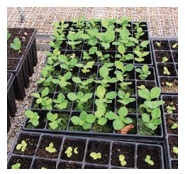
Hence, the
total number of saplings = 10 rows ×
5 saplings in each row = 10 × 5 =50 saplings
Likewise,
David planted some saplings. Not knowing the total number of rows and saplings in
each row, how will you express the total number of saplings?
For the unknown
quantities, we call them as ‘x’ and ‘y’. Therefore, the total number of saplings
=
‘x’ rows ×
‘y’ sapling in each row
= ‘x × y’ = xy saplings
Let us extend
this situation, Rahim planted saplings where the number of rows are (2x2 +
5x − 7) and each row contains 3y 2 saplings. Now the above idea
will help us to find the total number of saplings planted by Rahim.
The total
number of saplings = (2x2 + 5x − 7) rows × 3y2 saplings in each row.
= 3y2 × (2x2 + 5x − 7)
How do we
find the product of the above algebraic expression?
Now,we will
learn to find the product of algebraic expressions.
Note
Polynomial
A polynomial is an expression containing two or more algebraic terms.
In a polynomial all variables are raised to only whole number powers.
a2 + 2ab + b2
4x2 + 3x – 7
A polynomial cannot contain :
1) Division by a variable. Eg. 4x2 – (5/1+x) is not a polynomial.
2) Negative exponents. Eg. 7x–2
+ 5x – 6 is not a polynomial.
3) Fractional exponents. Eg. 3x3 + 4x1/2 + 5 is not a polynomial.
Monomial
An expression which contains only one term is called a monomial.
Examples:
4x, 3x2 y, −2 y2 .
Binomial
An expression which contains only two terms is called a binomial.
Examples: 2x + 3, 5y2 + 9 y, a2b2 + 2b
Trinomial
An expression which contains only three terms is called a trinomial.
Examples : 2a2b −8ab + b2
, m2 −n 2 + 3